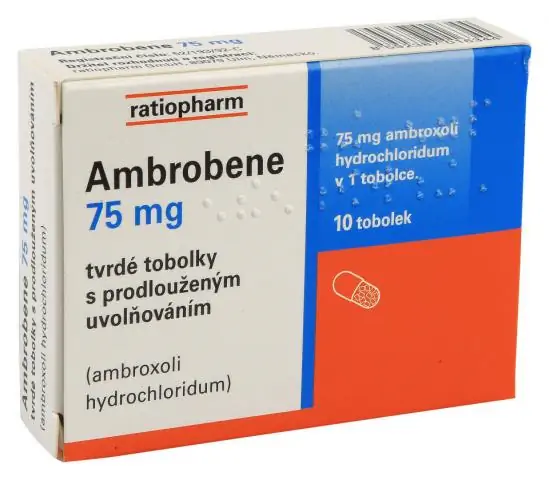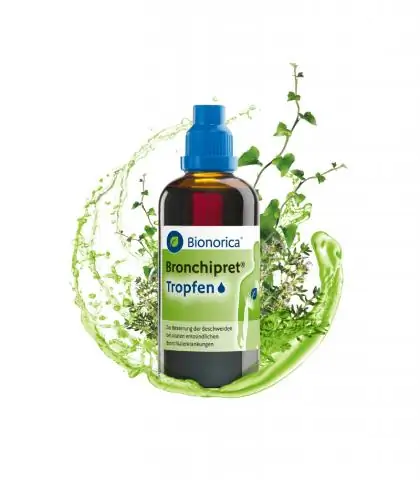- Author Rachel Wainwright wainwright@abchealthonline.com.
- Public 2023-12-15 07:39.
- Last modified 2025-11-02 20:14.
Rosehip syrup
Rosehip syrup: instructions for use and reviews
- 1. Release form and composition
- 2. Pharmacological properties
- 3. Indications for use
- 4. Contraindications
- 5. Method of application and dosage
- 6. Side effects
- 7. Overdose
- 8. Special instructions
- 9. Use in childhood
- 10. Drug interactions
- 11. Analogs
- 12. Terms and conditions of storage
- 13. Terms of dispensing from pharmacies
- 14. Reviews
- 15. Price in pharmacies
Latin name: Rosae syrup
ATX code: A.13. A
Active ingredient: Rosehip fruit (Rosae fructus)
Producer: Ivanovskaya pharmaceutical factory (Ukraine), LLC "BEGRIF" (Russia), CJSC "VIFITECH" (Russia)
Description and photo update: 2018-17-05
Prices in pharmacies: from 29 rubles.
Buy

Rosehip syrup is a herbal multivitamin preparation.
Release form and composition
The dosage form of the drug is syrup: thick, homogeneous, from reddish-brown to light brown (in orange glass bottles of 100, 200, 250 or 300 ml, in a cardboard box 1 bottle).
Active ingredients in 10 g syrup:
- rosehip extract liquid - 3.18 g;
- ascorbic acid - 0.03 g
Auxiliary components: citric acid monohydrate - 0.02 g; sucrose (sugar) - 6.77 g.
Pharmacological properties
Pharmacodynamics
Actions of Rosehip syrup, due to its constituent components (ascorbic acid, carotenoids, flavonoids, organic acids, etc.):
- increased nonspecific resistance of the body;
- increased tissue regeneration;
- decrease in vascular permeability;
- influence on carbohydrate and mineral metabolism;
- increased bile formation.
Indications for use
- hypovitaminosis C;
- asthenic conditions (as part of complex treatment);
- recovery period after infectious diseases, including colds.
Contraindications
Absolute:
- cholelithiasis;
- glucose-galactose malabsorption, fructose intolerance, sucrase / isomaltase deficiency;
- individual intolerance to the components contained in the preparation.
Do not appoint Rosehip syrup to children under 2 years of age.
Relative contraindication (a disease in the presence of which the administration of the drug requires caution): diabetes mellitus (since the drug has a high sugar content).
Instructions for the use of Rosehip syrup: method and dosage
The drug is taken orally with water.
Dosing regimen:
- therapy: adults and children aged 12 years - 1-2 tbsp. spoons 2-3 times a day, children 2-3 years old - 1/2 teaspoon, 3-6 years old - 1 teaspoon, 6-12 years old - 1 dessert spoon 2-3 times a day. The duration of treatment varies from 15 to 30 days;
- prevention in the winter-spring period: adults - 1 tbsp. spoon 2 times a day, children 2-3 years old - 1/2 teaspoon 2 times a day, 3-6 years old - 1/2 teaspoon 3 times a day, 6-12 years old - 1 tsp. spoon 3 times a day, children from 12 years old - 1 teaspoon 5 times a day.
Side effects
According to the instructions, Rosehip syrup can cause the development of allergic reactions.
Overdose
There are no data on overdose.
special instructions
In diabetes mellitus, it should be borne in mind that 1 teaspoon of syrup contains approximately 0.38 bread units (4.6 g of sucrose), 1 tbsp. spoon - approximately 1.15 bread units (13.8 g of sucrose).
In cases of combined intake of Rosehip syrup with other multivitamin preparations, in order to avoid possible overdose, it is important to take into account the content of ascorbic acid in its composition.
Pediatric use
For children of Rosehip, syrup is contraindicated under the age of 2 years.
Drug interactions
With the combined use of Rosehip syrup with some drugs / substances, the following effects may develop (due to the presence of ascorbic acid in the drug):
- preparations of the iron group, tetracycline and penicillin: increasing their absorption;
- indirect anticoagulants, heparin: a decrease in their clinical effect;
- sulfonamides, salicylates: increased risk of crystalluria;
- acids, including acetylsalicylic acid: slowing down their excretion by the kidneys;
- drugs with an alkaline reaction, including alkaloids: an increase in their excretion;
- oral contraceptives: a decrease in their concentration in the blood.
Analogs
The analogs of Rosehip syrup are Rosehip fruits and Rosehip liquid extract.
Terms and conditions of storage
Store in a place protected from light and moisture at temperatures up to 25 ° C. Keep out of the reach of children.
The shelf life is 6 months.
Terms of dispensing from pharmacies
Available without a prescription.
Reviews of Rosehip syrup
According to reviews, Rosehip syrup is an affordable and effective drug that is not addictive.
Price for Rosehip syrup in pharmacies
The approximate price of Rosehip syrup (250 ml in bottles) is 40-85 rubles.
Rosehip syrup: prices in online pharmacies
|
Drug name Price Pharmacy |
|
Rosehip syrup 100 ml syrup 1 pc. RUB 29 Buy |
|
Mirrolla Rosehip syrup 250 ml 1 pc. RUB 44 Buy |
|
Rosehip syrup 250 ml syrup 1 pc. RUB 55 Buy |
|
Rosehip syrup syrup 250 ml 1 pc. RUB 68 Buy |

Maria Kulkes Medical journalist About the author
Education: First Moscow State Medical University named after I. M. Sechenov, specialty "General Medicine".
Information about the drug is generalized, provided for informational purposes only and does not replace the official instructions. Self-medication is hazardous to health!






